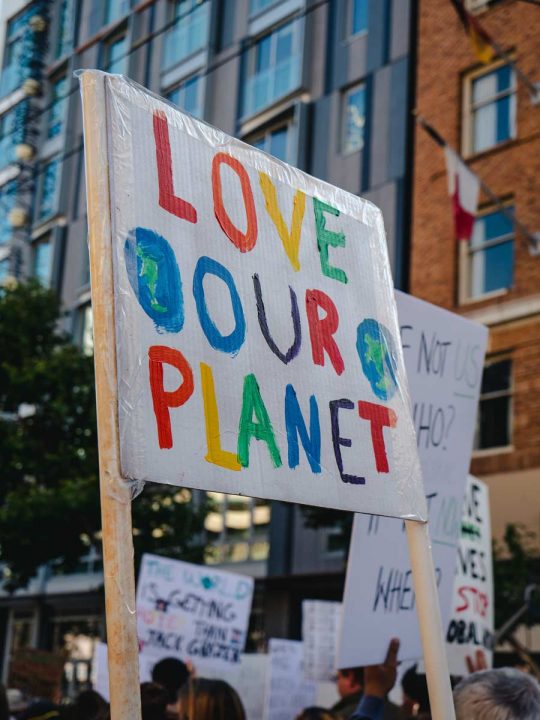The views expressed in our content reflect individual perspectives and do not represent the authoritative views of the Baha'i Faith.
As we approach the end of the calendar year, we’re bombarded by events ranging from department store sales to annual awards such as person-of-the-year, movie-of-the-year, and more.
Dictionary publishers annually engage in one of these easily overlooked traditions, the naming of the word or phrase of the year. Did you know that Collins Dictionary selected “climate strike” as “word of the year” for 2019?
I recently learned that the first Strike for Climate Action took place in November 2015. This year, as most of us know, a large-scale global climate strike movement has begun, one that includes weekly student strikes each Friday. Intended to call attention to climate change and to stimulate action, these gatherings occur in countless locations throughout the world.
Though the details of each strike may differ, all speak to an emerging global consciousness and the role we as individuals, working through our institutions, have in caring for our planet.
A few weeks ago, I attended the Friday for the Future and Strike for Climate Action in a nearby Canadian city. Since I live in a small town some distance away and without any bus service, my only option was to drive there. Frankly I wasn’t happy about that, but sometimes I have to drive if I want to “show up and be counted,” as the saying goes.

As I neared the rally’s location, I saw a stream of students marching and chanting about fossil fuels. Some of them shook their fists at me, jeering because there I was, in a car. I opened the window and shouted, “I’m just trying to park so that I can join you,” pleading for their forgiveness for my sin of driving.
Seeing the youthful faces, feeling the youthful energy, I thought about a statement from the Baha’i International Community directed to youth to encourage their involvement in contemporary issues.
The involvement of youth is not something to be sought for [their] sake alone, nor a tool designed to advance [their] needs as a specific population group. Rather, it is a component critical to the well-being of all of humankind, young and old alike. – The Baha’i International Community, Builders of Civilization: Youth and the Advancement of Humankind, a statement to the 2014 World Conference on Youth.
I remembered myself as a university student in the ‘60s, marching to protest the Vietnam War and in support of student rights and academic freedom. I recalled our earnestness — and that we did so at risk of our education and even our personal safety. Fortunately, the current strike would not provoke tear gas, and no one would get arrested.
I found myself in a crowd of over 4000 people, most of whom seemed to be university age. I wondered if other older adults also reflected on their own past as we marched.
Many people carried signs with phrases ranging from “It’s up to us” to “I am skipping class to teach others.” Most commented on issues such as “Don’t Be a Fossil Fool” while others spoke of worst-case scenarios; a few even offered hope. Again, thinking about the 1960s, I realized that the issues are just as complex now as they were then – perhaps even more so.
Indigenous peoples presented during the first half-hour of the march, though the purpose was not for entertainment or to discuss atrocities against the indigenous population of Canada. Rather, they explored the relationship between people and nature, our responsibilities as stewards for all living things, and our ongoing efforts to embrace our differences as well as our commonalities:
Although we are in different boats, you in your boat and we in our canoe, we share the same river of life. – Chief Oren Lyons, Onandaga Nation.
Then came one of the highlights – hearing members of a regional symphony and chorus performing Beethoven’s “Ode to Joy.” As the music elevated our spirits and sent a ripple of love and hope through the crowd, I thought about these words by Baha’u’llah, the founder of the Baha’i Faith:
We, verily, have made music as a ladder for your souls, a means whereby they may be lifted up unto the realm on high. – Baha’u’llah, The Most Holy Book, p. 38.
One speaker asked everyone to tell a stranger why they were there. A young woman shared with me that she has now reached voting age and wants to become more engaged in issues as she transitions to adulthood. She also told me she had arrived that day on a bicycle used by her mother during her own university days, when protesting issues of the 1980s. I wondered if her grandmother, my age peer, had taken part in the ‘60s protest movement like I did.
Once again, a quotation from Baha’u’llah perfectly suited the moment:
Be anxiously concerned with the needs of the age ye live in and center your deliberations on its exigencies and requirements. – The Proclamation of Baha’u’llah, p. 116.
Yet another segment of the rally featured fifth grade students. They wondered about their own futures, asking why people in leadership roles and public policy jobs don’t take climate change more seriously; why do immediate profits seem to be more important than care for the Earth; and if they could understand the science at their young age, why didn’t everyone? In a gut-wrenching moment, a 10-year-old admitted he suffers from anxieties.
Back in the ‘60s, we thought we understood the issues, though I suspected even then that partisan factions manipulated our actions and fractured our solidarity. Today’s issues seem more straightforward, more tangible. I realize that having clear questions does not always mean clear answers, though. Indeed, solutions to climate change are not linear, not formulaic, not to be reduced to a checklist of what to do. On the other hand, many actions are so obvious that, as one protest sign put it, “Why are we even still debating this in 2019?”
The sign maker will be changing “2019” to “2020” in a few weeks. I dearly hope they do not have to change it yet again to “2021.” Let’s pray that this time next year there will be no need for more marches.
















Comments
Sign in or create an account
Continue with Googleor